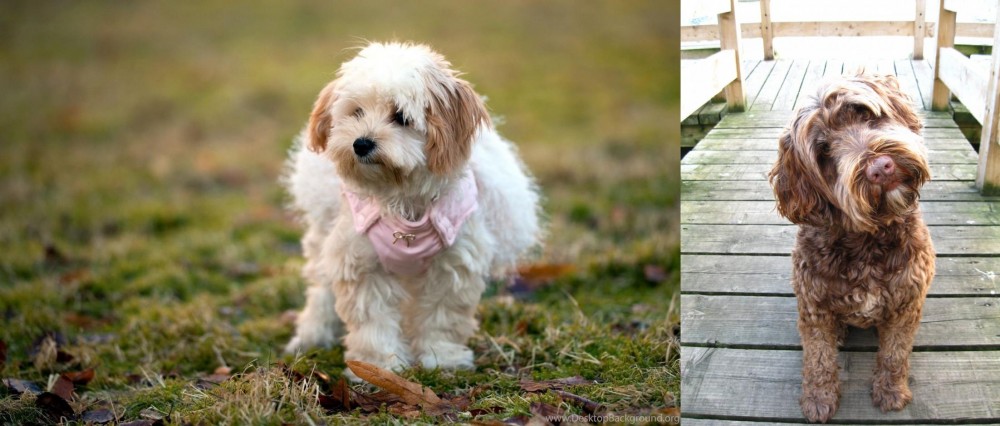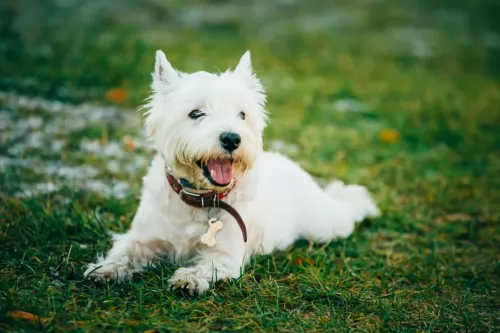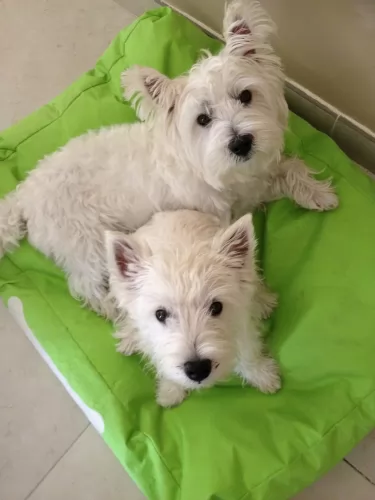 Petzlover
Petzlover West Highland White Terrier is originated from United Kingdom but Portuguese Water Dog is originated from Portugal. West Highland White Terrier may grow 27 cm / 10 inches shorter than Portuguese Water Dog. West Highland White Terrier may weigh 17 kg / 37 pounds lesser than Portuguese Water Dog. Both West Highland White Terrier and Portuguese Water Dog has almost same life span. Both West Highland White Terrier and Portuguese Water Dog has almost same litter size. West Highland White Terrier requires High Maintenance. But Portuguese Water Dog requires Low Maintenance
West Highland White Terrier is originated from United Kingdom but Portuguese Water Dog is originated from Portugal. West Highland White Terrier may grow 27 cm / 10 inches shorter than Portuguese Water Dog. West Highland White Terrier may weigh 17 kg / 37 pounds lesser than Portuguese Water Dog. Both West Highland White Terrier and Portuguese Water Dog has almost same life span. Both West Highland White Terrier and Portuguese Water Dog has almost same litter size. West Highland White Terrier requires High Maintenance. But Portuguese Water Dog requires Low Maintenance
 The West highland white terrier originated from Poltalloch in Scotland. So they were initially called as Poltalloch terrier and after that they were called as Roseneath terrier. They were initially used for hunting fox, badger, otter and in killing the vermin like rats.
The West highland white terrier originated from Poltalloch in Scotland. So they were initially called as Poltalloch terrier and after that they were called as Roseneath terrier. They were initially used for hunting fox, badger, otter and in killing the vermin like rats.
The breed history says that Colonel Malcolm of Poltalloch was the reason for the Westie's white colour. This is because in 19th centuryhe went for hunting with his dogs and accidentally he shot his dog as its colour was as fox. So he decided to breed only white colour dogs.
 The Portuguese Water Dog is a working dog hailing from the Portuguese region of the Algarve. The dog has always been a friend of the sea, working around fishing boats, loving his life around water.
The Portuguese Water Dog is a working dog hailing from the Portuguese region of the Algarve. The dog has always been a friend of the sea, working around fishing boats, loving his life around water.
He descends from dogs that have always been used by Portuguese fishermen, and its believed he has Poodle in him. Known also as the Cao de Agua, which means Dog of the Water, the Portie as he is also known, almost disappeared.
Their numbers dropped in the early 20th century, but a certain Vasco Bensuade saved the breed, forming a breed club, writing a breed standard.
They then also made their way to England and the United States. It was in 1972 that the Portuguese Water Dog Club of America formed. In 1983, the AKC recognized the dog as a distinct breed.
 The Westie can be said as that a small dog having the talents of the big dog. They are very popular for their obedience. They are also working as therapy dogs and also some in search and rescue teams. The home having Westie will have fun always and be enthusiastic. They will suit them for country or city living, but they like to live with their family. They are well suitable for apartment living, but some training should be given to them for not barking. They can stay in home when you are at work. Westie can be taken to travel, whether it may be long vacation or a short visit.
The Westie can be said as that a small dog having the talents of the big dog. They are very popular for their obedience. They are also working as therapy dogs and also some in search and rescue teams. The home having Westie will have fun always and be enthusiastic. They will suit them for country or city living, but they like to live with their family. They are well suitable for apartment living, but some training should be given to them for not barking. They can stay in home when you are at work. Westie can be taken to travel, whether it may be long vacation or a short visit.
They are quick learners and so training them is not difficult. Mistakes of them can be corrected patiently since they don't like harsh activities against them. Westie will definitely bark when he sees something or hear different sounds. He will bark on seeing visitors or even other dogs. Sometimes they will bark for very silly things but when given appropriate training in their young stage, they can bark only for alerts.
 Standing at between 43 and 57cm in height and weighing in the region of 16 to 27kg, the Portuguese Water Dog is a medium-sized, curly-coated dog.
Standing at between 43 and 57cm in height and weighing in the region of 16 to 27kg, the Portuguese Water Dog is a medium-sized, curly-coated dog.
It is believed that the dog is hypoallergenic. He does however shed, though not a lot. He just loves the water and is always ready to plunge in. One of the distinctive characteristics of this dog is its webbed feet.
The Portuguese Water Dog is an intelligent dog that will do well with training and socialization.
It won’t be troublesome training this dog as he is intelligent. They're also calm dogs. Referred to fondly as the Portie, this is a fun-loving dog, friendly and social, getting on well with all members of his human family.
These dogs get on well with children and other family pets. They can be reserved toward strangers, but this makes them good watchdogs.
 The Westie is friendly with children but not all the time. So some care should be taken while they are near children.
The Westie is friendly with children but not all the time. So some care should be taken while they are near children.
They like to chase rodents like rabbits as they are interested in hunting.
They are suitable for apartment living unless they are left alone for a very long time. They love cold weather more than hot.
They can be trained by giving some extra efforts.
 With training, your Portie can make a splendid pet. He is also adaptable to different living situations, and is capable of living in the city or in the countryside, just so long as his exercise needs are met.
With training, your Portie can make a splendid pet. He is also adaptable to different living situations, and is capable of living in the city or in the countryside, just so long as his exercise needs are met.
He is such an affectionate and loyal, fun-loving dog while also being hard working, and all these wonderful characteristics mean that he can be a treasured pet and companion.
 Portuguese Water Dogs are generally healthy, but like most other dogs they are more prone to certain heath conditions, though your pet is unlikely to get any of them. Still it pays to know of some of the more complicated- and disabling ones.
Portuguese Water Dogs are generally healthy, but like most other dogs they are more prone to certain heath conditions, though your pet is unlikely to get any of them. Still it pays to know of some of the more complicated- and disabling ones.
This is where the thighbone doesn't fit properly into the hip joint. Hip dysplasia spells pain for your dog and he may show lameness with one or both rear legs. Arthritis can develop too.
Hip dysplasia is hereditary, but it can be worsened by allowing your dog to become obese and from injuries from leaping off your bed for instance.
This is a degenerative eye disorder that can lead to blindness, but fortunately it is detectable long before the dog shows signs of blindness.
Reputable breeders have the eyes of their dog certified each year by a veterinary ophthalmologist and they don’t allow the dogs to produce puppies.
 The puppy should be fed 3 to 4 times per day as it requires a considerable amount for their growth. Cooked chicken breast and turkey are best for them and also vegetables should be given to them. Beef and chicken should be kept a limit as it will lead to itchy skin and allergies.
The puppy should be fed 3 to 4 times per day as it requires a considerable amount for their growth. Cooked chicken breast and turkey are best for them and also vegetables should be given to them. Beef and chicken should be kept a limit as it will lead to itchy skin and allergies.
The preferable food for the Westie is home cooked. The home food will only contain all the essential nutrients for the Westie.
Eventhough the Westie is suitable for apartment living it is recommended to have a daily walk for him to be active and refreshing.
They should be made to play for atleast 30 minutes per day for their health as to not gain overweight. Grown up children can play with them as they like it.
 Your Portie is a dog that loves outdoor life and lots of exercise. Take him with you on your walks and give him a run off his leash. When he gets home, if you have a pool h’ll be the first to plunge right in. He makes a great pet to have at the sea too.
Your Portie is a dog that loves outdoor life and lots of exercise. Take him with you on your walks and give him a run off his leash. When he gets home, if you have a pool h’ll be the first to plunge right in. He makes a great pet to have at the sea too.
Provide him with plenty of nice chewy toys, balls and ropes so he doesn’t get bored.
Provide him with a nice, dry, warm sleeping area and don’t allow him to be disturbed when he retreats there.
Keep his vaccines up to date to prevent some life threatening illnesses.
Provide him with high quality food that has lots of vitamins and minerals instead of fillers, preservatives, colorants and toxins.
There are some excellent commercially manufactured dog foods which can be convenient and good for your pet. Try and provide him with some tasty homemade food occasionally. Nothing spicy and exotic. Dogs thrive on simplicity and consistency.
Boiled chicken, brown rice or pasta, carrots, spinach and sweet potatoes chopped up and added twice week to the dry kibble is all your dog requires to keep him energetic happy, thankful, healthy and happy.
A little bit of raw meat added in from time to time will be superb. See that he always has access to clean, cool water.